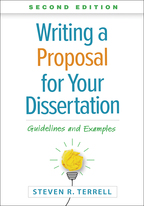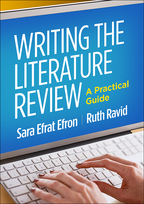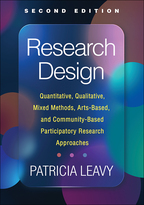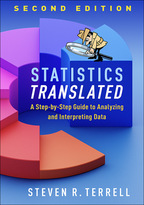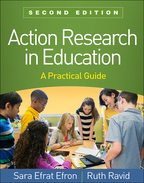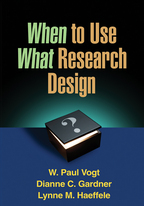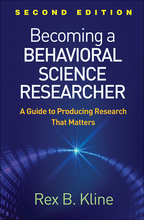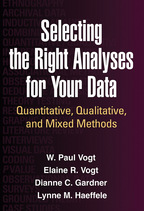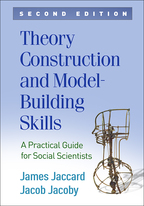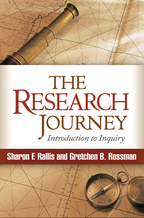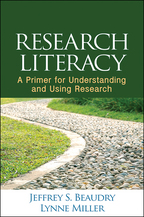Writing a Proposal for Your Dissertation
Second Edition
Guidelines and Examples
Steven R. Terrell
HardcoverPaperbacke-bookprint + e-book
Hardcover
orderSeptember 5, 2022
ISBN 9781462550258
Price: $62.00 320 Pages
Size: 7" x 10"
Paperback
orderOctober 31, 2022
ISBN 9781462550234
Price: $41.00320 Pages
Size: 7" x 10"
e-book
orderAugust 31, 2022
PDF and Accessible ePub ?
Price: $41.00 320 Pages
ePub is Global Certified Accessible
print + e-book $82.00 $49.20
orderPaperback + e-Book (PDF and Accessible ePub) ?
Price: 320 Pages
ePub is Global Certified Accessible
“One of the biggest hurdles to timely completion of a doctoral degree is a well-written and defensible dissertation proposal. Terrell's second edition is an exceptional go-to resource. The revised and updated chapters on developing problem statements and writing the literature review are particularly helpful. Presenting clear guidelines and useful examples, the book breaks down the steps needed to efficiently produce an effective proposal. Isolating the importance/need/rationale for the dissertation and linking that to specific research questions written in a clear and answerable manner (via quantitative, qualitative, or mixed methods) is a particular strength of this text.”

—John S. Carlson, PhD, Department of Counseling, Educational Psychology, and Special Education, Michigan State University
“This book can be used at multiple stages in the dissertation development process, beginning with the first time a topic is considered. This book helps take the guesswork out of the dissertation process, fills in details that seasoned writers may forget to mention, and answers questions that students are sometimes afraid to ask. The second edition includes a broader range of examples and adds emphasis to navigating the 'people' portion of writing the proposal and maximizing the use of technologies and other resources. It is written like a conversation, which makes the advice seem like it is coming from an old friend. This book aligns well with the process we are already using to help students develop their dissertation proposals and offers details that help to reinforce the next steps for students.”

—Pamela K. Brown, EdD, Department of Kinesiology, University of North Carolina at Greensboro
“Useful changes in the second edition include an expanded discussion of the purpose statement and the review of literature, as well as more attention to ethical research, data collection, data analysis, and research designs. Terrell continues to cover such important research topics as sampling, instrumentation, reliability, validity, and different levels of measurement. The book is comprehensive in its coverage of topics, provides clear and concise examples, is affordable, and is a valuable asset for my doctoral students.”

—Steven B. Mertens, PhD, School of Teaching and Learning, Illinois State University
“A good book for students who have taken a comprehensive research methods course and are now embarking on their own original research project. The second edition provides a wider array of examples from a number of disciplines, as well as expanded information on purpose statements and writing the review of literature. It retains such strengths from the first edition as progress checks and review questions in each chapter, and detailed descriptions of threats to internal and external validity.”

—Katherine K. Rose, PhD, Department of Human Development, Family Studies, and Counseling, Texas Woman’s University
“The most difficult objective students have is development of their methods, followed by conducting a properly synthesized literature review. This text does an excellent job in covering both of these topics. My students find it both approachable and very useful.”

—Tobin Hindle, PhD, Scientist and Graduate Program Director, Department of Geosciences, Florida Atlantic University
—John S. Carlson, PhD, Department of Counseling, Educational Psychology, and Special Education, Michigan State University
“This book can be used at multiple stages in the dissertation development process, beginning with the first time a topic is considered. This book helps take the guesswork out of the dissertation process, fills in details that seasoned writers may forget to mention, and answers questions that students are sometimes afraid to ask. The second edition includes a broader range of examples and adds emphasis to navigating the 'people' portion of writing the proposal and maximizing the use of technologies and other resources. It is written like a conversation, which makes the advice seem like it is coming from an old friend. This book aligns well with the process we are already using to help students develop their dissertation proposals and offers details that help to reinforce the next steps for students.”
—Pamela K. Brown, EdD, Department of Kinesiology, University of North Carolina at Greensboro
“Useful changes in the second edition include an expanded discussion of the purpose statement and the review of literature, as well as more attention to ethical research, data collection, data analysis, and research designs. Terrell continues to cover such important research topics as sampling, instrumentation, reliability, validity, and different levels of measurement. The book is comprehensive in its coverage of topics, provides clear and concise examples, is affordable, and is a valuable asset for my doctoral students.”
—Steven B. Mertens, PhD, School of Teaching and Learning, Illinois State University
“A good book for students who have taken a comprehensive research methods course and are now embarking on their own original research project. The second edition provides a wider array of examples from a number of disciplines, as well as expanded information on purpose statements and writing the review of literature. It retains such strengths from the first edition as progress checks and review questions in each chapter, and detailed descriptions of threats to internal and external validity.”
—Katherine K. Rose, PhD, Department of Human Development, Family Studies, and Counseling, Texas Woman’s University
“The most difficult objective students have is development of their methods, followed by conducting a properly synthesized literature review. This text does an excellent job in covering both of these topics. My students find it both approachable and very useful.”
—Tobin Hindle, PhD, Scientist and Graduate Program Director, Department of Geosciences, Florida Atlantic University

